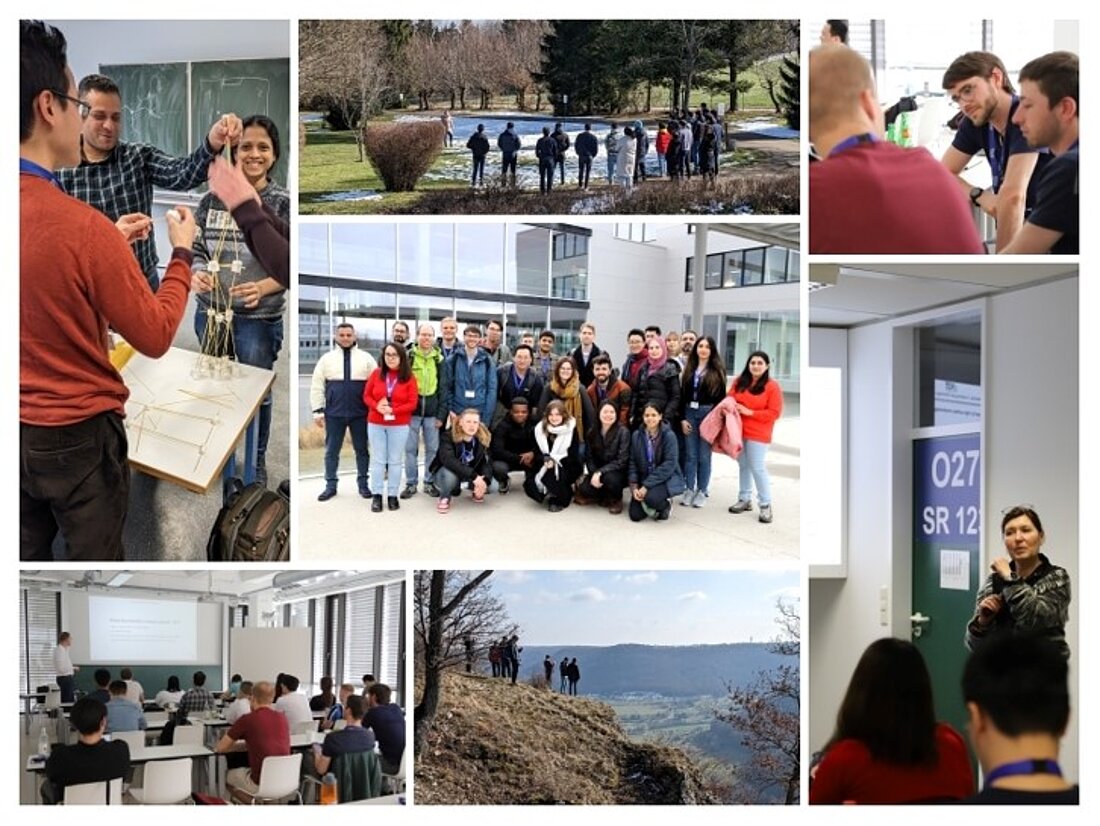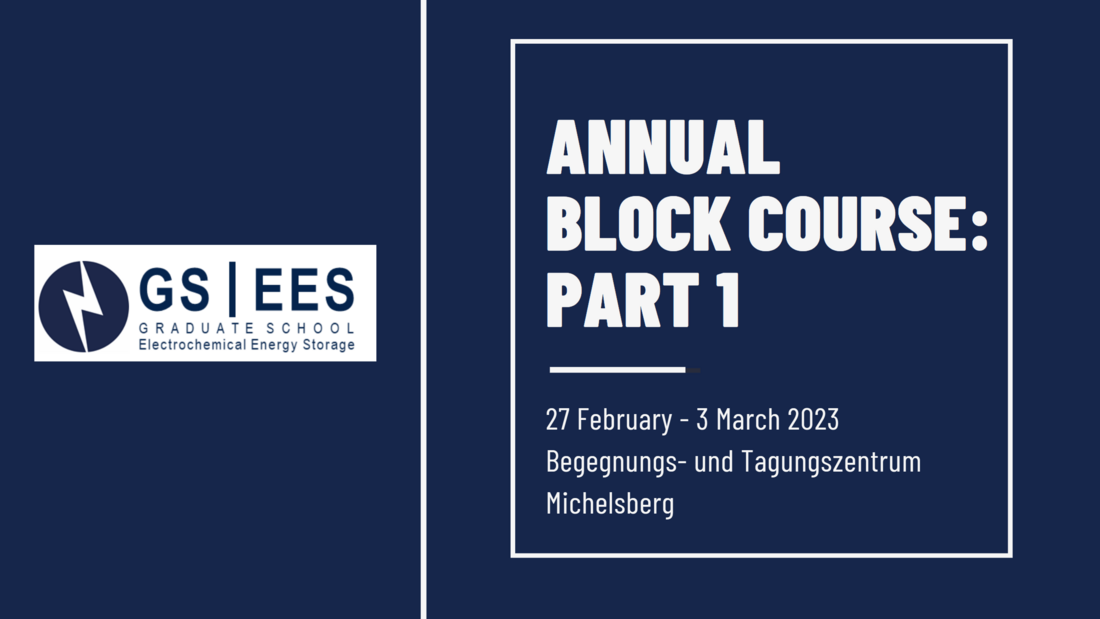Block Course 2025
Scope
The lectures of the Block Course "Materials, Functioning and Technology of Batteries" cover the full spectrum of electrochemical energy storage and conversion, from theory to engineering and from fundamentals to applications.
Poster sessions and social events like lab tours, joint dinners offer ideal conditions to connect to other young researchers in the field.
Target Group
The Block Course of the GS-EES is open to all interested PhD, master students and post-docs, no matter at which institution they are enrolled. Registration can be done for each part individually.
Dates and Venue
Part 1
24th to 28th February 2025
Ulm University
N25 | H9
89081 Ulm, Germany
Part 2
7th to 11th April 2025
Karlsruhe Institute of Technology (KIT)
Building 20.30, 0.014
76131 Karlsruhe, Germany
Costs
The Block Course is free of charge for GS-EES members and master students related to CELEST.
If you are uncertain whether you can participate free of charge, please get in touch with us.
The fee for external participants is 170 € per part.
It includes snacks, cold and warm beverages during coffee breaks and two times dinner.
Accomodation
Accomodation is not included.
Contact
In case of any questions related to the Block Course, please email Johannes Schnaidt or call +49 (0)731 50 34506.
Registration
Registration for the Block Course 2025 is closed. In case of any questions, please contact Dr. Johannes Schnaidt at johannes.schnaidt@uni-ulm.de.
Impressions of previous years

Preliminary Schedule
Part 1
| Time | Monday, 24 February 2025 | Tuesday, 25 February 2025 | Wednesday, 26 February 2025 | Thursday, 27 February 2025 | Friday, 28 February 2025 |
|---|---|---|---|---|---|
| 09:00-10:30 | Surfaces/Interfaces Prof. Dr. Jürgen Behm |
Atomistic Perspective I Prof. Dr. Axel Groß |
Lab Tour POLiS/HIU |
From Materials to Cells + Mg/Ca Batteries Dr. Mario Marinaro |
|
| 10:30-11:00 | Welcome / Round of Introduction | Break | Break | Break | Break |
| 11:00-12:30 | General Introduction Prof. Dr. Maximilian Fichtner |
Electrode-Electrolyte Interaction Prof. Dr. Jürgen Behm |
Atomistic Perspective II Prof. Dr. Axel Groß |
Walk back to University |
Participants' Presentation |
| 12:30-13:30 | Lunch | Lunch | Lunch | Lunch | |
| 13:30-15:00 | Electrode Materials I Prof. Dr. Maximilian Fichtner |
Participants' Choice | Good Scientific Practice Dr. Christian Punckt |
Ethics in Publishing Jonas Mirbeth |
|
| 15:00-15:30 | Break | Break | Break | Break | |
| 15:30-17:00 | Electrode Materials II Prof. Dr. Maximilian Fichtner |
Fuel Cells Dr. Ludwig Jörissen |
Good Scientific Practice Dr. Christian Punckt |
Group Work - Preparation Participants' Presentations | |
| 17:00-17:15 | Break | Break | Break | Break | |
| 17:15-18:00 | Poster Session | Poster Session | Group Work - Preparation Participants' Presentations | ||
| 18:00 | Joint Dinner | Joint Dinner | |||
Part 2
| Time | Monday, 7 April 2025 | Tuesday, 8 April 2025 | Wednesday, 9 April 2025 | Thursday, 10 April 2025 | Friday, 11 April 2025 |
|---|---|---|---|---|---|
| 09:00-10:30 | Diffraction and Tomography Prof. Dr. Helmut Ehrenberg |
Battery Safety Dr. Carlos Ziebert |
Sulfur and Potassium Batteries Dr. Fabian Jeschull |
Sodium-Ion Batteries Dr. Andreas Hofmann |
|
| 10:30-11:00 | Welcome / Round of Introduction | Break | Break | Break | Break |
| 11:00-12:30 | Phase-field and Particle Based Modeling Prof. Dr. Marc Kamlah |
Aqueous Battery Systems Prof. Dr. Helmut Ehrenberg |
Participants' Choice |
Sustainability Analysis of Batteries Dr. Marcel Weil |
Participants' Presentation |
| 12:30-13:30 | Lunch | Lunch | Lunch | Lunch | |
| 13:30-15:00 | Electrochemical Characterization and their Physiochemical Principles Prof. Dr. Christine Kranz, Prof. Dr. Rolf Schuster |
Electrolytes Prof. Dr. Dominic Bresser |
Production of Batteries Prof. Dr. Jürgen Fleischer |
Group Work - Preparation Participants' Presentations | |
| 15:00-15:30 | Break | Break | Break | Break | |
| 15:30-17:00 | Electrochemical Characterization and their Physiochemical Principles Prof. Dr. Christine Kranz, Prof. Dr. Rolf Schuster |
Microscopy Prof. Dr. Christian Kübel |
Prodcution of Batteries Prof. Dr. Jürgen Fleischer |
Group Work - Preparation Participants' Presentations | |
| 17:00-17:15 | Break | Break | Break | Break | |
| 17:15-18:00 | Poster Session | Poster Session | Lab Tour Forschungsfabrik | Participants' Presentations | |
| 18:00 | Joint Dinner | Joint Dinner | |||
Preliminary contents of lectures
Part 1
Prof. Dr. Maximilian Fichtner
General Intro and Electrode Materials
Considerations on (electrical) energy storage and the role of batteries in the energy transition, principles of (Li-ion) batteries, cathode and anode materials.
Prof. Dr. Jürgen Behm
Surfaces / Interfaces
Fundamentals of surfaces and interfaces (thermodynamics, structures, kinetics of surface processes) and how they relate to batteries.
Electrode - Electrolyte Interactions
Fundamentals and model studies on interactions between electrodes and electrolytes, XPS (X-ray Photoelectron Spectroscopy).
Dr. Ludwig Jörissen
Fuel Cells
Introduction to fuel cells and their use in mobile applications.
Prof. Dr. Axel Groß
Atomistic Perspective
Quantum chemical description, DFT (Density Functional Theory).
Dr. Christian Punckt
Good Scientific Practice
Introduction to Good Scientific Practice
Jonas Mirbeth
Ethics in Publishing
Considerations of potential problems regarding the scientific publication process. Introduction to open access publishing.
Dr. Mario Marinaro
From Materials to Cells
Fundamental considerations regarding the transition from the materials level to the cell level.
Mg/Ca Batteries
Introduction to electrode materials, electrolytes, promises and challenges of Mg- and Ca- (ion) batteries as bivalent post-Lithium batteries.
Preliminary contents of lectures
Part 2
Prof. Dr. Marc Kamlah
Phase-field and Particle Based Modeling
Phase-field modeling of the interaction of diffusion and mechanics in electrode particles of batteries. Discrete element and Resistor Network modeling of transport and mechanics in granular electrodes.
Prof. Dr. Christine Kranz + Prof. Dr. Rolf Schuster
Electrochemical Characterization Techniques and their Physicochemical Principles
Challenges and requirements in characterization of battery processes, general introduction to characterization techniques, fundamentals of electrochemistry fundamentals, widespread electrochemical methods cyclic voltammetry (CV) and electrochemical impedance spectroscopy (EIS), glimpse of electrochemical microcalorimetry and Scanning electrochemical probe microscopy.
Prof. Dr. Helmut Ehrenberg
Diffraction and Tomography
Fundamentals and application in battery research of diffraction and tomography methods based on x-rays and neutron.
Aqueous Battery Systems
Introduction to the still widely used lead acid battery and alkaline batteries.
Prof. Dr. Dominic Bresser
Electrolytes
Fundamentals of electrolytes (mass transfer, diffusion, migration, conductance, mobility). Examples beyond “common” liquid electrolytes like solid ion conductors and ionic liquids.
Prof. Dr. Christian Kübel
Microscopy
Introduction to (electron) microscopy methods and their application in battery research.
Dr. Carlos Ziebert
Battery Safety
Testing of battery safety (mostly using calorimetry), heat generation during normal use and abuse.
Prof. Dr. Jürgen Fleischer
Production of Batteries
Steps of battery production from electrode manufacturing, cell assembly to module and pack production. The lecture is given in a research factory so that there is insight into the production steps in a research set-up for flexible battery production.
Dr. Fabian Jeschull
Sulfur and Potassium Batteries
Introduction to electrode materials, electrolytes, promises and challenges of sulfur and - potassium batteries.
Dr. Marcel Weil
Sustainability Analysis of Batteries
Social, economic and environmental aspects of sustainability. Life cycle assessment of different batteries.
Dr. Andreas Hofmann
Sodium-ion Batteries
Introduction to electrode materials, electrolytes, promises and challenges of Na (ion) batteries.

